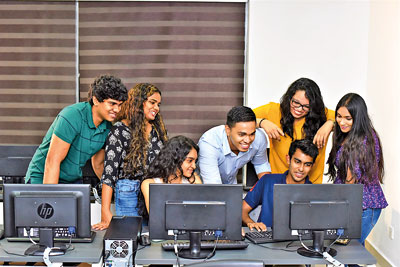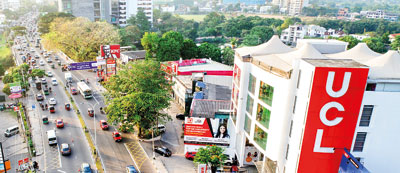(Hons) Software Engineering Degree from UCLan at UCL
View(s): The most versatile IT Degree in Sri Lanka
The most versatile IT Degree in Sri Lanka
The University of Central Lancashire (UCLan) is a well-known provider of career-focused education degrees that gives students the tools needed to thrive on the global stage and is benchmarked as a university that is at the forefront of developing degrees in evolving disciplines like Software Engineering.
The University of Central Lancashire (UCLan) UK being a top 100 UK university is affiliated with Universal College Lanka (UCL), who is known for establishing partnerships with top ranked universities in the world. UCL’s collaboration with UCLan has resulted in bringing students in Sri Lanka, the opportunity to study for the industry renowned BSc (Hons) in Software Engineering that is designed with employability in mind.
It has been developed in consultation with industry experts. Therefore the curriculum and experience gained by students at UCL has all the components that are at the forefront of advancements in technology. This is aligned with UCL’s vision to develop a highly skilled workforce for current and future industry needs in Sri Lanka.
Providing an insight into the BSc (Hons) Software Engineering degree curriculum, Mr. Thepul Ginige, Senior Lecturer and Programme Coordinator at UCL stated “use of technology is increasing in everyday life, and there’s a constant need for the software behind it to be updated, maintained and improved.
 Our foundation and degree programmes therefore focus on and develops a student’s software development skills in a practical and hands-on manner. It is a diverse course, that covers all the basic knowledge required and a range of technologies from mobile app development to enterprise applications across the whole software development lifecycle, from understanding requirements through to design and implementation and testing.
Our foundation and degree programmes therefore focus on and develops a student’s software development skills in a practical and hands-on manner. It is a diverse course, that covers all the basic knowledge required and a range of technologies from mobile app development to enterprise applications across the whole software development lifecycle, from understanding requirements through to design and implementation and testing.
In the degree first year, students will develop interactive games using 3D-graphics, Computer Networks and Security and System Analysis and Database Design. In Year 2, they work in a team to design and develop substantial, realistic applications and learn how to apply industry-standard software development techniques to traditional and distributed applications, design efficient databases using a leading database management system and to programme effectively in Java and C++ and Mobile applications. They study communications and networks as well as participate in a team-based software development project to apply their project management skills.
By Year 3, they will be ready to tackle complex, concurrent systems involving multiple, interacting components, where they will take a one-year industrial placement in one of the top 25 blue chip companies in the country and get opportunities to work on live projects for real clients, thoroughly preparing them for immediate employment.
 These contemporary and professionally focused opportunities equip our graduates with the expertise needed to take their dreams to elevated heights, perfectly blending high quality academic study with real-world practice to offer a learning experience that is truly value based and gives students the opportunity to build a portfolio of software projects that they can showcase to potential employers. Students are encouraged to do a 1-year internship after the 2nd year and return to finish the final year of study.”
These contemporary and professionally focused opportunities equip our graduates with the expertise needed to take their dreams to elevated heights, perfectly blending high quality academic study with real-world practice to offer a learning experience that is truly value based and gives students the opportunity to build a portfolio of software projects that they can showcase to potential employers. Students are encouraged to do a 1-year internship after the 2nd year and return to finish the final year of study.”
Mr. Ginige also emphasised on further value-based activities that are carried out at UCL.
These comprise of guest lecturers from top industry personnel that share their expertise, providing professional insight and enhancing learning experiences and the research work and publishing will help students gain more academic expertise and international exposure. Others include training workshops that develop and enhance management skills and knowledge of organisational contexts.
Mr. Ginige concluded “Making sure what students learn with us is relevant, up to date and what employers are looking for is our priority. Therefore, the grounding they get with us will help them to challenge conventional thinking and develop their own solutions to the many issues in software engineering and provide them a pathway to study and specialise in any of the futuristic technologies in the industry.”
For further details please contact UCL on 0774 110 000 or visit the Campus at 503, Sri Jayewardenepura Mawatha, Rajagiriya. Sri Lanka.



